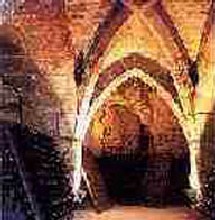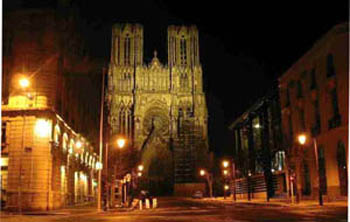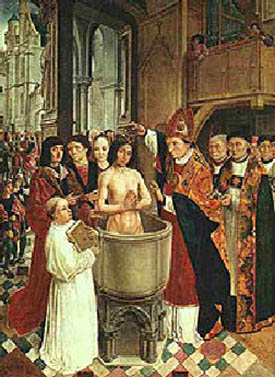 |
The Saint of the Day
St. Remigius (Remy) – October 1
Prof. Plinio Corrêa de Oliveira
Biographical selection:
St. Remigius was born around the mid-fifth century close to the city of Laón, France, where a saintly hermit lived. This hermit, who was blind, was afflicted not over this suffering, but over the situation of the Catholic Religion in France, which had been devastated by the Vandal persecution. One night, while he was praying for the Church, he heard a celestial voice that said to him:
“God has heard your prayers and deigns to look again upon the earth from the highest heaven so that all nations will praise the marvels of His omnipotence and kings will be honored to serve Him. Know that the woman named Celina will give birth to a son to whom she will give the name of Remigius. To him God reserves the glory to save His people.”

St. Remigius,
Apostle of the Franks
|
When Celina heard this message, she doubted his words since she was already old. But the monk went on:
“Know this, you will give birth to a son and while you are nursing your child, you are to anoint my eyes with your milk, and so restore my sight.”
These things happened as foretold. St. Remigius was born into the noble house of his parents, Emilius, Count of Laón , and St. Celina, and the hermit’s sight was restored. …
Some time later when Remigius was 22-years-old, Benange, Archbishop of Rheims, died. The people, inspired by God, called for him to succeed Benange. When he was consecrated Bishop, he was anointed with a holy oil on his forehead by a mysterious hand that all present could see and an exquisite perfume permeated the whole area. …
[For a period he suffered from various temptations … ] For this reason St. Remigius is efficiently invoked in temptations of flesh and spirit. Those who have difficulty in meditating or comprehending the divine mysteries also find a great support in St. Remigius. …
One day a terrible fire whipped through the city of Rheims. Everyone gathered to help extinguish the devouring flames. But all efforts were useless. When the people had given up hope of stopping it, St. Remigius advanced to the heart of the fire carrying a cross and faced the most violent flames. The fire was stopped in its tracks and soon was completely subdued. …
St. Remigius evangelized throughout Gaul, and converted Clovis, King of the Franks. On Christmas Eve of 496, the night that preceded the ceremony of the baptism of Clovis, St. Remigius spent several hours in prayer before the altar of the Church of St. Mary. Afterward, he went to the residence of the King. Taking advantage of the silence of the night, he wanted to give some last instructions to the Monarch before his baptism. In the oratory of the palace, the Queen, St. Clotilde, wife of Clovis, awaited his arrival. With her were the King and various other nobles. The Saint arrived and gave an admirable sermon.

A splendorous light filled the chapel where St. Remigius was preaching to the King and Queen of France
|
While he was speaking, a splendorous light appeared in the chapel that far outshone the dim light of the candles, and a loud voice was heard saying: “Peace be with you. It is I, do not fear. Remain in my love.” The physiognomy of the man of God was shining with a fiery brilliance. The King and the Queen knelt before the Prelate. Moved by the spirit of God, he made these prophecy:
“Your posterity shall nobly govern this kingdom, which will give much glory to the Holy Church. It shall inherit the Empire of the Romans. This nation will not cease to prosper so long as it follows the path of truth, but decadence will come upon it with vices and bad customs. For, in truth, it is in this way that all kingdoms and nations have fallen into ruin.”
At the end of his life, St. Remigius became blind. Far from grieving over this, he rejoiced, saying that by this means he could suffer with Our Lord Jesus Christ. He knew prophetically the day of his death many days before. At the end, he miraculously regained his sight so that he could see his flock and distribute his goods as he desired. When the day came, even though he was not sick, he made his farewell as if he were leaving on a long trip, and then died.
Comments of Prof. Plinio:
These excerpts invite us to analyze several different aspects of St. Remigius’ life.
First, the Gaul [Galias, in Latin] of St. Remigius’ time was old France. It was the name the Romans gave to her when they dominated over what is present day France. As a consequence of the invasion of the Barbarians, France entered a lamentable situation. In fact, prior to the invasion, innumerable Romans in Gaul were Catholics, but lukewarm Catholics, without character and merit. The Barbarians who took over France were mostly pagans who had deviated from the sound doctrine to Arianism, led by a heretic Bishop called Ulfilas.
Therefore, it was in this tragic situation that we find that afflicted blind hermit praying for the Catholic Church. He was praying at night, the selection says , that is, added to the darkness of his blindness was the darkness of the night. We don’t know how long he had been praying – for days, months or years. He was in a historic situation that reminds us of our own, when God seems to have turned His back on humankind and to no longer care about what happens in the world. At that moment he received a celestial message that began with these words: “God has heard your prayer.” It was the reward for all his waiting and longings.
The message continued: “God decided to look again upon the world.” We can see that this is an encouragement for us to keep praying for the restoration of the Catholic Church. He received the message that Celina would have a son, Remigius, and that God would use him to again reign over the world, and that the powerful would be honored to serve God. It is a very beautiful message, because it was, in fact, the birth of Christendom that was being announced.
The difference between the situation of the Church at the time of the Roman Empire and the Church in the Middle Ages was that under the Romans, the powerful were not honored to serve Our Lord. There was almost no saintly king in the times of the Roman Empire. On the contrary, in the Middle Ages we note that the powerful and great of the earth frequently were the most zealous Catholics, and the impulse for the sanctification of the souls often came from the apex of temporal society. This was a remarkable change. When Christ reigns through the earthly kings, we have the Kingdom of Christ. It was the establishment of the Kingdom of Christ that was being announced.
Second, a beautiful scene is that of the consecration of St. Remigius as Bishop. God wanted to manifest His favor, so Our Lord made His hand appear carrying the holy oils surrounded by light and emitting an exquisite perfume. Our Lord himself consecrated St. Remigius as Bishop.

The Cathedral of Rheims at night
|
Third, regarding St. Remigius as patron saint of those who want to make good meditations, it is the first time I have heard about a saint with this kind of patronage. Normally, the difficulty in meditation comes from an intellectual obstacle, and the patronages of Saints are generally turned toward giving a spiritual help. But it is very interesting to see that St. Remigius is a patron for this intellectual problem as well. He helps to put the mind aright so it can understand the things of God. Therefore, if one of us has difficulty in recollecting himself and elevating his thoughts toward God, he has the right intercessor in St. Remigius.
Fourth, the episode of the Saint confronting the fire is also remarkable. The Bishop advanced without hesitation to the very heart of the fire. We can imagine him wearing his miter and Roman tunic and carrying his pastoral cross walking against the flames. Then, as the Bishop and the fire met, the flames started to diminish and finally were extinguished. The people, who were following the scene with admiration, fell to their knees. After the fire was conquered, St. Remigius returned to the people and blessed them. We can imagine the prestige the Church acquired with a miracle like this, and the enormous glory given to God.
There is a symbol in this episode. When the true man of God, especially when he is a Bishop, opposes an enemy, there is no obstacle that can support his presence. This is an overall truth in the spiritual realm. When the man of God faces the enemies and opposes them, they inevitably are curbed.

The baptism of Clovis marked the beginning of the glorious future of France
|
Fifth, the episode of the sermon of St. Remigius to the converted King Clovis is magnificent. It is nighttime, and the small city of Rheims is silent; everyone is sleeping. Only a few lights appear in the royal chapel. There is also a man walking through the twisting streets of Rheims. It is St. Remigius on his way to the royal palace. He arrives bearing with him all the blessings from the prayers he has just said.
In the chapel Clovis is recollected, preparing himself to be baptized the next day. With him is St. Clotilde, praying. Also present are some clerics and nobles. St. Remigius enters, seats himself, and begins to speak. He prophesies about the future of France and the glory to God that this nation will give. Its entire history is synthesized in a few words. Everyone understands that the glorious future of France is linked to the baptism of King Clovis. When St. Remigius finishes, silence descends again upon the souls. They are thinking about that page in the book of History that will be turned the next day.
Facts like these about the life of St. Remigius transport us to an atmosphere completely different from the sad one we live in today. I note this parallel not to discourage us, but rather to give us strength. For Our Lady can obtain from Our Lord extraordinary graces for the Catholic Church in order to restore her. Our Lady can do this either through the catastrophes of the chastisements she announced in Fatima, or perhaps by the birth of another St. Remigius who will reconstruct the sacred edifice, prostrate so desolately in our days.
Therefore, in addition to our other legitimate individual intentions, we should ask St. Remigius to obtain the restoration of the Catholic Church, which is in a situation of unimaginable misery. We should ask God to turn His eyes again upon the world and His Church and do whatever is necessary to give birth to another Catholic era.


  | | Prof. Plinio Corrêa de Oliveira | |
The Saint of the Day features highlights from the lives of saints based on comments made by the late Prof. Plinio Corrêa de Oliveira. Following the example of St. John Bosco who used to make similar talks for the boys of his College, each evening it was Prof. Plinio’s custom to make a short commentary on the lives of the next day’s saint in a meeting for youth in order to encourage them in the practice of virtue and love for the Catholic Church. TIA thought that its readers could profit from these valuable commentaries.
The texts of both the biographical data and the comments come from personal notes taken by Atila S. Guimarães from 1964 to 1995. Given the fact that the source is a personal notebook, it is possible that at times the biographic notes transcribed here will not rigorously follow the original text read by Prof. Plinio. The commentaries have also been adapted and translated for TIA’s site.
|
Saint of the Day | Home | Books | CDs | Search | Contact Us | Donate

© 2002- Tradition in Action, Inc. All Rights Reserved
|
 |

|